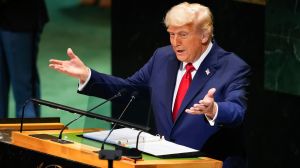Army takes over in Fiji, declares martial law
SUVA, MAY 29: Fiji's army seized power and declared martial law on Monday, ten days after gunmen first stormed Parliament and overthrew th...

SUVA, MAY 29: Fiji’s army seized power and declared martial law on Monday, ten days after gunmen first stormed Parliament and overthrew the country’s elected government led by ethnic Indian Prime Minister Mahendra Chaudhry in the name of indigenous Fijians. The move came just hours after the army took control of Suva and announced that troops had been given `shoot to kill’ orders to enforce a curfew across the capital.
The army’s intervention followed an overnight rampage by supporters of George Speight, the leader of the coup against Chaudhry, Fiji’s first ethnic Indian premier.
In a terse statement issued at the Queen Elizabeth barracks, army Chief Commodore Frank Bainimarama said: "The nation has been saddened by the extent to which the country has fallen during the last week. I have therefore, with much reluctance, assumed executive authority."
Bainimarama’s move to assume power came just two days after President Ratu Sir Kamisese Mara appointed himself as the country’s interim ruler and dismissed Chaudhry and his government.
Banaimamara gave no details of how he would rule. But diplomatic sources told AFP his intention was to dismiss the president and appoint himself the Prime Minister.
The army chief said all movement into parliament would be restricted to essential services and appealed to the people to respect the curfew, which he said would run for 48 hours.
Shortly before the curfew came into force at 6 pm (11.30 am IST), soldiers took up strategic positions around the capital, setting up barricades across main roads and at key installations, including fuel depots and radio and television stations.
The move was preceded by an appeal on national radio for all reserve troops under the age of 55 to come to the Queen Elizabeth barracks, the army’s main headquarters here.
The army’s move came after a night of rioting by Speight supporters, who rampaged through Suva armed with weapons and sticks, attacking the offices of the national television station and killing one policeman.
As the crisis worsened, Australia on Monday urged its 2,000 nationals based in Suva and an estimated 3,000 tourists to leave as soon as possible. The US embassy issued similar advice.
Many families in the capital, as well as expatriates, were moving to the west of the country. Some foreign journalists were also leaving after being threatened.
Earlier today, in the first killing in the 11-day crisis, a policeman died from his injuries after he was shot in the back during the night’s rioting. A security guard also died from a heart attack overnight.
Photos



- 01
- 02
- 03
- 04
- 05




























